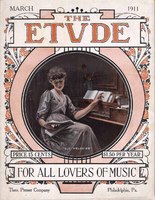At a recent meeting of the “Musical Association” in London the leading address was made by George Bernard Shaw, he of the hydrocyanic acid tongue, the incandescent mentality and the Dantelike foresight. It was expected that Mr. Shaw would throw off his usual shower of epigrammatic sparks. On this occasion, however, Mr. Shaw’s verbal magneto was out of order, and everything he said was as tame as the efforts of the ten-shilling-a-week genius who grinds out jokes for alleged comic papers. In fact, if Mr. Shaw had not made a reputation as a writer of exotic musical criticisms we should find it difficult to understand just why he should be among the assemblage of common and ordinary garden musicians, whose subsequent remarks made the meeting memorable.
Most sensible of all were those of Mr. James Glover, musical director of the classic Drury Lane Theatre, who is known to all London as “Our Jimmy.” Mr. Glover is an accomplished and able musician, and his remarks, which follow, are worth reading any time in any music-loving country. Among other things, Mr. Glover said that the world was crying for real melody, but the great composers would not condescend to write real melodies in the form in which the public could appreciate them. He endeavored to supply what they wanted. The academic side of the musical world had kept apart. He tried to encourage the better class of musicians to write for the small orchestra. What did the mass of the people know of Elgar, except his “Salut d’Amour” and “Pomp and Circumstance”? Elgar had to get his early work published in Leipzig by a German firm, and he gave it a French title. The band parts of “Pomp and Circumstance” were not available for general use until they were scored for small orchestra. Gentlemen who talked so much at colleges should sit down and do something. Drury Lane band played twice a day to 3,000 people. The management wanted a melody that would run through the pantomime from 7.15 to 11.15. Why should it be by James Glover? He preferred to take reverently a beautiful melody from Tschaikowsky’s Pathetic Symphony, and the audience would hear it 47 times, whether they liked it or not.
Amen, Mr. Glover; let us have more understandable music, music with a head or a tail to it. Oh, for a Moses to lead us out of the wilderness swept by the bleak winds of discord and the blinding sands of stupefying counterpoint!



